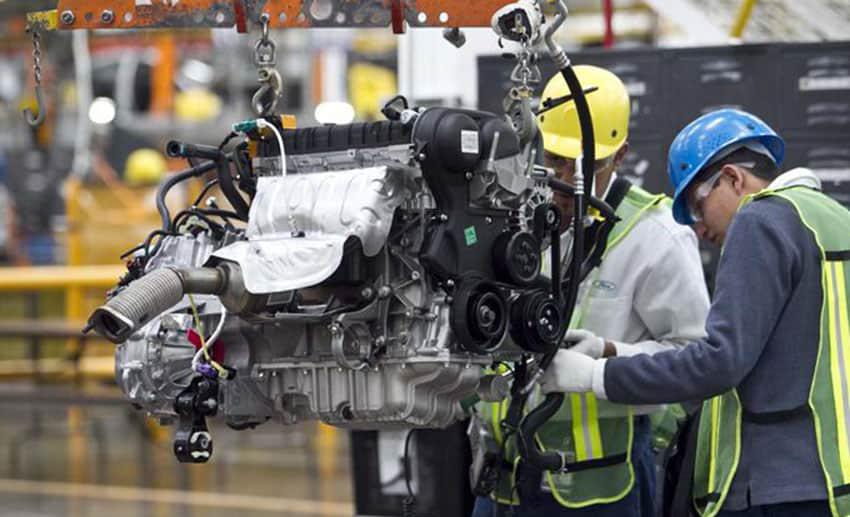GENERAL SITUATION IN MEXICO
Weekly Review I August 16, 2023



Weekly Review I August 16, 2023


Mexico lacks a network of pipelines to bring natural gas to the entire national territory, which limits the country’s possibilities for generating, attracting, and retaining investment and talent in high-value-added sectors, according to the Mexican Institute for Competitiveness (IMCO).

“Mexico has the potential to be one of the main beneficiaries of the relocation of global value chains, known as nearshoring. However, to take advantage of this opportunity, the country requires competitive energy infrastructure,” said the research center in a statement regarding its research “No natural gas, no nearshoring”.
The access and use of natural gas have an impact on economic growth since they directly impact the cost of production of goods and services, so it is necessary to expand the coverage of gas pipelines to regions that do not have access to the fuel, said the institute.
Despite the fact that between 2011 and 2022 the length of the gas pipeline network grew by more than 50%, natural gas transportation infrastructure is still insufficient to guarantee supply in certain regions of the country, such as the south-southeast, which contributes, in part, to the industrial deficit and low competitiveness of the region, according to IMCO.
The supply of natural gas in Mexico in 2021 was 8 thousand 131 million cubic feet per day (MMcfd), of which 2 thousand 203 came directly from production fields operated by public and private companies, or from Pemex’s gas processing centers, while 5 thousand 928 MMcfd were imported, according to the organization.
48.1% of the demand was concentrated in the six northern border states (Baja California, Chihuahua, Coahuila, Nuevo Leon, Sonora, and Tamaulipas), while the nine states of the south-southeast region accounted for only 16% of the demand.
With the exception of Puebla, Tabasco, Veracruz, and Yucatán, demand from the rest of the states in the south-southeast region was marginal (Oaxaca) or non-existent (Campeche, Chiapas, Guerrero, and Quintana Roo).
On the other hand, Baja California Sur, Campeche, Chiapas, Colima, Guerrero, Nayarit, Oaxaca, Quintana Roo, and Sinaloa did not demand natural gas for industrial use or electricity self-generation, or their demand was marginal (less than or equal to 0.02% of total demand), said the IMCO.
It added that the capacity of the existing infrastructure must be expanded while providing the transportation system with redundancy to guarantee a continuous supply of natural gas to industry, the electricity sector, and households that demand it.
“Only in this way will Mexico be able to take full advantage of the opportunity presented by nearshoring and fulfill the objective of developing the south-southeast of the country,” they said.
In its report, the IMCO considered it essential to complete the natural gas transportation projects that are currently underway, such as the Tuxpan-Tula and Tula-Villa de Reyes pipelines, the expansion of the Mayakan pipeline in the Yucatan Peninsula, the extension of the maritime pipeline to Coatzacoalcos, Veracruz, and Paraiso, Tabasco; and Jáltipan-Salina Cruz.
It even proposed reactivating inactive projects, such as the Salina Cruz-Tapachula pipeline, and incorporating new projects to provide a competitive supply to the Yucatán peninsula or to entities such as Guerrero.
“Only in this way will Mexico be able to capitalize on its geography, commercial openness, and labor force, and consolidate itself as a power for investment in the context of nearshoring,” affirmed. Expanding the gas pipeline network to all regions of the country is an indispensable condition for democratizing the potential benefits of the regionalization of value chains and advancing the nation’s energy transition, it said.
Therefore, IMCO proposed facilitating investment in natural gas transportation infrastructure, investing sufficient resources for the expansion of the gas pipeline network to the south-southeast and reducing the environmental impact of the construction of natural gas transportation infrastructure. It also suggested converting conventional thermoelectric plants to natural gas, since those that use fuel oil and diesel to generate electricity produce more emissions of carbon dioxide, sulfur dioxide, suspended particles and other pollutants than combined cycle plants, which use natural gas.

August 9-15, 2023
• Judicial Power: The president responded to a reporter’s concerns about the right-wing’s alleged manipulation of the judicial system to undermine the government and its reforms. He argued that the judicial power isn’t aiming to defy public will, attributing their discontent to growing corruption accusations within the government’s ranks. He also highlighted the need for a judicial overhaul, starting with impartial judge appointments, favoring selection by the people rather than political or business influences. He gave the example of a governor’s attempt to block textbook distribution, stressing the Supreme Court’s role in this matter. He asserted that states opposing distribution defy the constitution due to conservative motivations. The president criticized the PAN party for opposing public education consistently and labeled them as anti-reform. He acknowledged citizens’ democratic right to choose the PAN but questioned their stance given available information.
• Development: The president responded to a reporter’s query about the potential economic impact of the Mayan Train and Corredor Interoceanico projects. He stated that these endeavors will
boost Mexico’s economic growth. He highlighted the U.S. government’s willingness to invest in Mexico for enhanced North American economic integration and reduced reliance on Asia. He stressed his aspiration for broader efforts that encompass the entire American continent, not just North America. He revealed plans to meet with U.S. President Joe Biden in November to emphasize the need for a comprehensive development plan across the continent, aiming to make the region a global powerhouse.
• Latin America Tour: Regarding the upcoming visit to Colombia, the president highlighted that the key agenda item will be addressing cooperation in drug-related issues. He emphasized the importance of addressing root causes to reduce violence, particularly through focusing on youth to prevent their involvement in antisocial behaviors.
• Security: In response to a comment from the President of El Salvador about differing security strategies, the Mexican President highlighted distinct perspectives and emphasized addressing root causes for lasting peace. He refrained from entering a dispute with President Bukele. He mentioned that the “war on drugs” worsened insecurity in the past and led to criminal groups. He noted a 17% reduction in homicides during his
administration. He also criticized past U.S. interference, citing the downgrade of Mexico’s airport security rating under Calderon’s presidency.
• Frente Amplio por Mexico: In response to a question about Enrique de la Madrid’s criticisms of the federal government during a recent forum, the President acknowledged that while he does believe De la Madrid made inappropriate and immoral decisions, he refrained from commenting further. He considered such statements normal during campaigns and mentioned that the Electoral Tribunal has a “blacklist” for this reason. He criticized media for distorting his comments made during press conferences.
• Elections 2023: The president stated that he will refrain from discussing Xochitl Galvez’s progress in the 2024 polls. He asserted that El Financiero newspaper is connected to powerful groups. The president claimed that both the Electoral Tribunal and the National Electoral Institute (INE) distorted his comments aimed at Xochitl Galvez, manipulating information to label his stance as gender-based political violence. Additionally, the president mentioned a group of lawyers associated with Claudio X Gonzalez, who lodged a complaint to prevent him from mentioning C. Xochitl Galvez. The president read a letter addressed to the judge who ordered him to cease the alleged “malicious” expressions against the senator, accusing the judge of protecting criminals. The president cited various instances including a suspension granted to Joaquin Guzman Loera to avoid extradition to the USA, modifying the National Vaccination Plan during the pandemic, allowing tobacco companies to prioritize profits

over public health, and reversing the ban on including child-oriented characters in high-calorie products. The president announced his intention to accuse the judge before the Federal Judicial Council (CJF) for investigation.
• Mayan Train: Updates on the Mayan Train project were provided, highlighting progress and job creation. The Environmental Ministry reported successes in protecting natural areas and addressing environmental concerns. The Mayan Train is anticipated to enhance tourism and economies in Chiapas and Tabasco. The project also links to other rail routes like the Interoceanic Corridor. Tabasco is becoming a logistics center with investments from major companies and tax incentives for border municipalities, fostering international trade.
• Reconstruction projects: Edna Elena Vega Rangel, Subsecretary of Territorial and Agrarian Planning, provided updates on the progress of the National Reconstruction Program. Since 2019, a total of
mentioned the total hydraulic infrastructure investment of 93.55 billion pesos.
68,224 actions have been implemented in this area. Furthermore, she stated that in 2023, the final year of the Program, 3,222 actions will be carried out. Similarly, Alejandra Frausto Guerrero, Secretary of Culture, reported on advances in the reconstruction of cultural heritage, highlighting a 73% completion rate. She mentioned plans to address 926 projects in this field during the current year.
• Water: The president addressed the need for budget allocation to address dam repairs and water-related issues. He emphasized that previous administrations had neglected these areas, leading to a backlog. His government is now prioritizing water projects and investing significantly in them. He mentioned completed and ongoing projects, including the “Presa Pilares” in Sonora and the Mazatlan aqueduct. He highlighted the importance of planning, in contrast to past administrations. He stressed the need for companies to establish themselves where water resources are available. He also announced the completion date of the La Libertad dam in Nuevo Leon and

• Jose Angel Gurria: A reporter pointed out Jose Angel Gurria’s involvement with Grupo Xcaret and how their interests seem to be affected by the current government. The reporter also mentioned that Gurria’s wife, Lulu Quintana, is related to one of the shareholders of Grupo Xcaret. In response, the president mentioned his role as Secretary of Hacienda when the FOBAPROA was approved and claimed that Gurria is currently working on the conservative group’s project. He emphasized that the Mayan Train is facing criticism from various “pseudo-environmentalist” groups. He noted that mineral extraction permits had been issued in the past for road construction in the U.S., which has caused dissatisfaction among these groups due to the government’s decisions.
• National airline: The Mexican government, through coordination among various ministries and worker associations, has resolved a long-standing issue regarding Mexicana de Aviacion. This achievement is recognized as a victory for over 7,000 aviation workers. The negotiations, mediated by the Ministry of Labor and Social Welfare, led to a consensus and formal confirmation of the purchase of the Mexicana de Aviacion brand. Plans were outlined for improved connectivity and coverage across the country, with the Felipe Angeles International Airport serving as the base. The acquisition of 10 new-generation Boeing planes is underway, and ticket sales are expected to start soon. The President was symbolically named the “first new pilot” of Mexicana de Aviacion by the Mexican Association of Airline Pilots. This marks a positive step forward after previous administrations’ lack of support for the airline industry.
• National infrastructure projects: The president discussed the purchase of Mexicana de Aviacion and highlighted a shift from previous administrations’ practices of selling public assets to private entities. He contrasted this with his administration’s approach, emphasizing that their projects have been funded with public money and are national assets. He pointed out examples of past administrations privatizing banks, mines, airports, and railways, whereas his government has undertaken transparent public projects like the Dos Bocas and Deer Park Refineries, Felipe Angeles International Airport (AIFA), Tulum International Airport, and the Maya Train. The president also explained that keeping airport infrastructure in public hands helps maintain competitive pricing. He further stated that AIFA charges only half the Airport Usage Fee (TUA) compared to the previous Texcoco airport project. He concluded by expressing confidence in the future profitability and self-sustainability of the Maya Train, AIFA, and the new Mexican Aviation Airline, all of which are government-owned ventures contributing to Mexico’s advancement.
• Economic situation: In a presentation based on a survey by Mexico’s National Institute of Statistics and Geography (INEGI) about 2022 income and expenses, the Mexican president highlighted that five million people were lifted out of poverty. He emphasized his administration’s focus on aiding the most vulnerable to achieve overall well-being, contrasting it with past “neoliberal” policies that favored the wealthy. Despite business recommendations to revert to previous economic systems
during the COVID-19 pandemic, the president chose to support vulnerable sectors for essential consumption. He praised the role of remittances and infrastructure investment in minimizing the crisis impact and boosting a 3% economic growth. The president also underscored the concept of “moral economy” in reducing poverty and inequality. He mentioned decreased internal migration due to poverty reduction in southern states and touted the lowest unemployment rate in decades. He plans to pass on leadership but will continue advising on sustaining the Fourth Transformation Movement, emphasizing investments in railroads, energy, renewables, and economic plans for various regions.
• Inflation: The president announced a decrease in inflation, from 5.06% in June to 4.79% in July. He emphasized that during the neoliberal era, myths persisted about the impossibility of raising wages due to their potential impact on inflation. However, his government has demonstrated the opposite.

• Migration: The president mentioned sending a letter to President Biden, acknowledging his creation of a legal pathway for migrants that didn’t exist before. He also highlighted Biden as the first U.S. president in decades not to build a wall. A positive understanding has been reached with the U.S. government, he stated. He stressed the need for a plan to combat poverty in Latin America, as migration stems from necessity. He argued that economically advantaged countries have an “obligation” to assist poorer nations.
• Inequality: The president affirmed that despite the pandemic and economic crisis, 5 million people have exited poverty, which hasn’t occurred in 40 years. He criticized the previous regime’s privatization approach, where the proceeds from asset sales were supposed to combat poverty. However, only ports, banks, railways, the electric industry, etc., were sold. Instead of reducing poverty, those decades saw increased inequality.
• Poverty reduction: The President celebrated the improved incomes of Mexican families, especially for the poor, as a sign that his strategy to prioritize them has been successful. He highlighted that both INEGI and CONEVAL reported a significant reduction in poverty, with the wage gap also decreasing. He addressed a decrease in healthcare access, attributing it to wording in the questions and changes in the social security system. He reiterated his commitment to building a world-class healthcare system. Additionally, he mentioned improvements in access to nutritious food, along with increased food security indicators.
• Health programs: Zoe Robledo, Director General of IMSS, shared progress on IMSS Bienestar 2023. Twenty-two states have joined the new healthcare system, with sixteen already operational. Dr. Hugo Lopez Gatell discussed efforts to create addiction-free communities through recreational activities. He highlighted a report indicating limited participation in such activities and emphasized the importance of the “Semilleros creativos” program led by the Ministry of Culture.

The medical device industry in Baja California has maintained a growth rate of between 9% and 10% annually, estimated the president of the State Medical Products Cluster, Socorro Macias Ahumada. She explained that this sector is made up of about 90 companies related to the manufacture of medical products, 70 of them directly and the rest as suppliers. She also commented that the medical industry generates more than 70 thousand jobs in Baja California, between direct and indirect.


SOURCE: EL IMPARCIAL


The Governor of Sonora held a meeting with executives from the company Mexico Pacific Limited and mayors of the areas where the construction and operation of the Saguaro Energia natural gas liquefaction plant will have a positive impact. He explained that the project will generate more than 13,000 direct jobs and 21,000 indirect jobs. “Lithium, for the manufacture of all the inputs for electromobility and the Sun, for the production of photovoltaic energy and this will turn Sonora into a natural gas liquefaction cluster,” he mentioned.
SOURCE: EL IMPARCIAL
Mexico Now in collaboration with the State Government, extends a cordial invitation to buyers, potential suppliers, and students dedicated to the aerospace industry, to join the experience of “Mexico’s Aerospace Nearshoring Summit 2023. During this meeting, Governor Maru Campos will present to international executives the outstanding strengths that characterize Chihuahua in this vital sector.
The dates set for this outstanding event are September 7 and 8, and the meeting place will be Expo Chihuahua. This space will be nurtured by the participation of renowned speakers, including figures such as Carlos Robles, who holds the presidency of the Mexican Federation of the Aerospace Industry; Jose Luis Rodriguez, Vice President and General Manager of Safran Cabin; and Luis Azua, a distinguished leader at the head of the Chihuahua Aerospace Cluster.


SOURCE: EL FINANCIERO

The Government of Texas announced that in 2024 it will formally begin work on the creation of a San Antonio-Laredo passenger train, with an extension to Monterrey, said Marco Gonzalez, Nuevo Leon’s Secretary of Regional and Agricultural Development.

The also honorary general director of the Nuevo Leon Border Zone Development Corporation (Codefront), explained that on August 2, Marc D. Williams, executive director of the Texas Department of Transportation (TxDOT), formally announced that this project will begin next year.

SOURCE: ABC NEWS


Claudio Bress, Secretary of Economy in Coahuila, held a meeting with members of the Union of Business Organizations of the Central Region of Coahuila, and there it was informed that members of the private initiative are working on the construction of industrial buildings, in order to promote Monclova and surrounding municipalities with international investors and to achieve the arrival of new companies.
Although this meeting was behind closed doors and without the presence of the media, it was Marco Antonio Ramon, president of the Union of Organisms, who informed the topics that were discussed.
SOURCE: VANGUARDIA

Tlajomulco has consolidated its position as the municipality with the largest number of industrial parks, mainly in manufacturing, logistics, and distribution chains.

This was announced by the mayor of the municipality, Salvador Zamora, who said that so far there are 35 such complexes, in addition to the fact that Tlajomulco has received private investment of 25 billion pesos from 2018 to date.
SOURCE: QUADRATIN

INEGI reports that in real terms, the states that led the monthly growth in industrial activity were Mexico, Morelos, Puebla, Zacatecas, and Quintana Roo. It referred to the case of Aguascalientes, with an increase of 0.6% with respect to the previous month.

However, Aguascalientes reported significant growth of 5.7% compared to April 2022, demonstrating progress in its economic activity.
SOURCE: HERALDO MX
GUANAJUATO
The Monthly Indicator of Industrial Activity by Federal Entity (IMAIEF) conducted by INEGI, places Guanajuato as the fifth state with the highest growth during the month of April.


The report highlights that the state had a 7.3% growth compared to the same period last year.
SOURCE: PERIODICO CORREO


In view of the nearshoring phenomenon, Queretaro will be one of the states that will benefit the most from the arrival of production centers, as well as from the attraction of value-added industry, stated the Undersecretary of Finance and Public Credit (SHCP), Gabriel Yorio, during his visit to the state.
After participating in the third edition of the Mexico Carbon Forum held in the state, he said that Queretaro’s economy is one of the most important in the country, driven by manufacturing activity, but also by the logistics industry.
SOURCE: EL ECONOMISTA
Claudia Sheinbaum envisions substantial economic growth for Mexico in the coming years, focusing on ensuring prosperity reaches both the less privileged and different regions. She emphasizes that growth will stem from nearshoring and domestic market activities. She highlights the positive impact of supporting lower-income groups in driving consumption and mentions the past success of redistributing resources to boost Mexico’s economy. Sheinbaum, the former Chief of Government of Mexico City, shares her national outlook with El Economista. While acknowledging the potential of nearshoring, she urges lessons from previous experiences with trade agreements and manufacturing, emphasizing sustainable and well-being-focused investments. She advocates for improved wages, environmental responsibility, increased domestic con-


tent in exports, and a stronger innovation culture within Mexico. She also calls for more investments in science and technology. On fiscal matters, Sheinbaum underscores the robust state of public finances, arguing against immediate tax hikes. Instead, she proposes supporting small businesses with tax payments and continuing efforts to combat tax evasion. She emphasizes the need to maintain financial discipline and the autonomy of the Central Bank due to its proven effectiveness.

Civil organizations, including the National Union of Parents and the National Front for the Family, plan to collect signatures from parents to file an injunction on Friday, seeking to halt the distribution of free textbooks exclusively in the State of Mexico for the upcoming school year. Lawyer Alfonso Bravo Alvarez stated that they’ll present the signatures to a federal judge to obtain the suspension before classes start on August 28. Multiple organizations have joined forces for this effort, using WhatsApp groups to gather signatures and ensure the injunction’s success.

German firm Group Mubea invests $57.7 million in Ramos Arizpe, Coahuila, for a new plant making automotive parts. It’ll generate 191 jobs and supply BMW, Ford, GM, and Tesla. Construction begins in September near Plan de Guadalupe International Airport.

GHSP-Mexico, a major player in automotive and electromechanical systems, is investing $10.2 million in Saltillo for expansion, bolstering the region’s economy and creating 70 new jobs, while emphasizing the importance of its skilled workforce and collaborative partnerships.
New investments from India are strengthening Nuevo Leon’s position as an electromobility and technology hub, with Grupo Motherson, set to establish a plant in the region, underlining the state’s draw for global investors due to its nearshoring advantages and proximity to the US economy.
Nuevo Leon solidified its status as a Latin American electromobility hub through agreements with Tata Group, including Tata Motors, Jaguar Land Rover, and a cooperation pact with Maharashtra state. This adds to existing partnerships with Tesla and KIA Motors, expanding the state’s international business connections.
Metalsa opened a $180 million plant in Guanajuato, producing 308,000 chasses annually for Toyota’s new Tacoma. The facility features advanced techno-
logy and generated 1,044 jobs. Toyota’s President announced progress on the new Tacoma, while Metalsa, a Mexican Tier 1 supplier, serves global clients including Toyota, Ford, GM, and Tesla.
Canadian company Magna Lighting is investing over $20 million in expanding its plant in Corregidora, Queretaro, generating up to 800 jobs in two phases and highlighting a 7.7% growth in transport equipment production. This expansion underscores their commitment to innovation and sustainability in the automotive industry.
Sumitomo Electric Wiring Systems will be the first Tier 1 automotive company in Tabasco, Mexico, generating 700 jobs and investing around $10 million to manufacture harnesses for clients like Honda, Ford, Toyota, General Motors, and Nissan. This move, supported by Tabasco’s governor, reflects the state’s increasing attractiveness in the automotive sector.
Mexican firm De Luna Lithium Battery shifts $80 million investment to the State of Mexico from Sonora due to delays. The new facility will produce 20,000 battery packs annually using Chinese lithium, meeting rising demand from U.S. firms and avoiding potential Chinese battery restrictions.
SOURCES: CLUSTER INDUSTRIAL, MEXICO INDUSTRY, EXPANSION MX